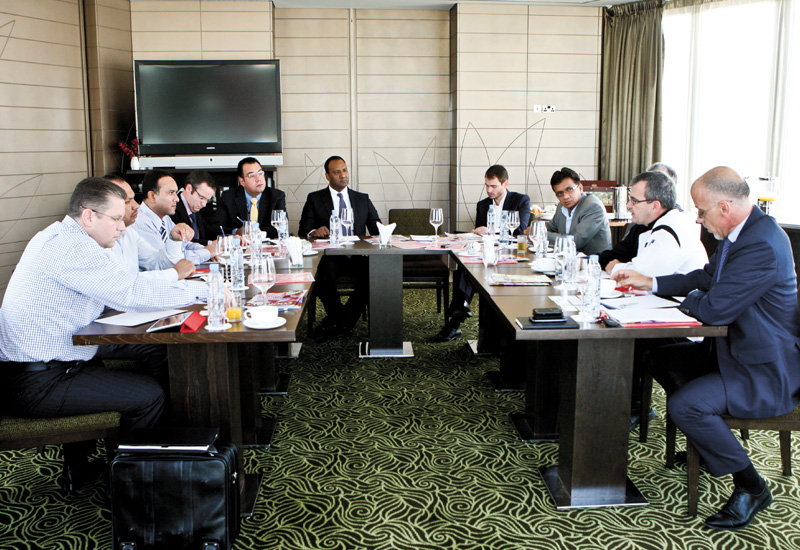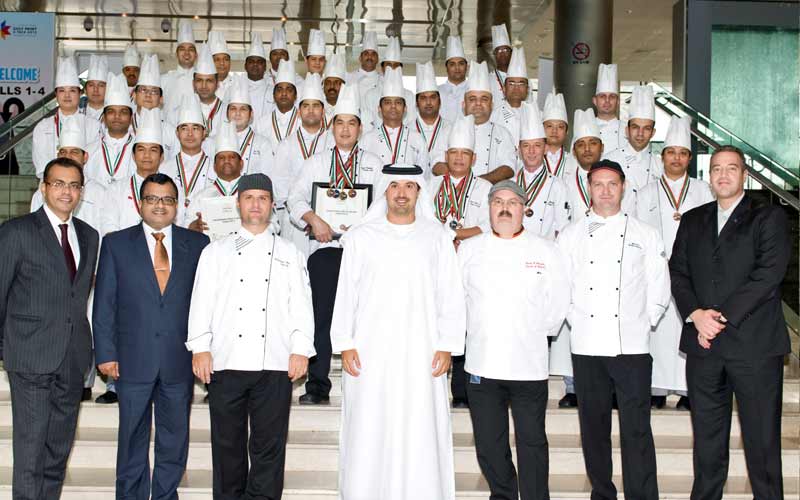Experts in the business of large-scale catering discuss the current industry trends and visions for the future, and how technology helps the sector
Events’ catering is a whole other ball-game for the industry. Creating and serving food for hundreds, or even thousands, of people, and sometimes not in your kitchen can be a hectic life for some. Caterer Middle East gathers together experts in the industry and quizzes them about what they do and how, and finds out what are the major concerns in the sector.
Can we get an idea of the scale of work you do?
Robert Mizrahi, senior business development manager Food Point & Linencraft, Emirates Flight Catering: In terms of size, we are currently producing in the region of a 150,000 meal equivalents per day.

| Advertisement |
Colin Campbell, corporate chef, Abela & Co: We have three major production kitchens, one in Dubai, one in Abu Dhabi, and recently opened one commissioning in Fujairah. Our total meal production is about 120,000 per day.
Harald Oberender, director of kitchens — event and hospitality services, Dubai World Trade Centre: We handle large events or catering, which includes royal weddings anywhere in the UAE. In exhibitions, you’re talking about two million covers per year. Currently we have 158 on the chef team, and roughly another 100 with stewarding. Altogether in hospitality, our team has over 800 members.
Samer Sabbagh, food and beverage manager, Emirates Flight Catering: At the moment we are doing about 160,000-170,000 meals a day. Plus we do the catering for the lounges — the first class and business class lounges for Emirates and other airlines as well. We also recently launched Food Craft to carry out corporate events; we used to do Dubai Air Show, Jazz Festival, and tennis tournaments.
Sudhanshu Sehgal, chief human resources Officer, Accuro Middle East: We have about 25 hospitals we cater to, including the largest government hospital. We also have a joint venture with the Varkey group for catering to all the GEMS schools so we feed about 25,000 kids a day.
Mohammed Naveed Ahmed, sales manager, IFFCO: We are the solution partner for most of the departments here — Accuro, Abela, and Emirates Flight Catering.
Craig Finney, head of sales foodservice – UAE, IFFCO: We’re a UAE-based organisation that pulls high quality ingredients from around the world and then manufactures them in the local area so you get the benefit of both worlds — high quality ingredients but also local service and low cost in a factory.
Okay, let’s talk about outsourcing staff catering and why that’s a trend now?
RM: When Food Point was started as a manufacturing facility about eight years ago, one of the strategic decisions which was taken at the time was not to do the catering in-house; we did that through Abela.
At that time, it was decided it would be better for Food Point to focus on its core activities therefore sub-contract or outsource the staff catering to one of the most reputable catering companies in Dubai.
CC: If you’re in the business of hotels where F&B outlets are geared towards servicing their guests, one of the common threads is that they are actively engaged in the business of making food ‘high-end’. To be quite blunt, the staff is not eating from its steak, they’re not eating American prime meat.
The point is to outsource to someone whose area of expertise or specialisation is, in terms of scale of economy, to pay significantly lesser than what a hotel would pay for it. It makes economic sense, it frees up the hotel and the chefs to do what it is that they do, which is cook five-star food for five-star clients.
Mohammad Khalid Saeed, food health inspection officer, food inspection section, Food Control Department, Dubai Municipality: What we have observed after doing inspections, especially in hotels, hospitals and schools, is that once the food or the kitchen is outsourced, the food safety standards are better. The reason being perhaps that the hotel kitchens are not designed for mass catering.
How flexible can events or mass catering be, especially if you’re doing them regularly?
HO: You just put the finger on the point, so to say. We need to keep our daily production efficient while being flexible, and handle events like a royal wedding in Abu Dhabi and the next day work on GITEX.
So our key is having quality outsourced partners. You are limited with your production facility to a certain extent, because there is only so much you can do in one particular location. It is a totally different ballgame so you have to very carefully consider what’s on the market at the moment.
SSa: We have our kitchen — next to the airport — where we can produce the raw material. Plus if we have to, we can do a side kitchen. We have done a lot of side kitchens but we have finished food mainly on-site.
Production capacity we can have as much as we want. In terms of staff members, I can take them from the airport — as much as up to 200-250 well-trained service staff as well as up to 230 high-loaders. The main thing is to have the right equipment in-house. If you have that, it’s not much of a challenge.
What if you don’t have your own kitchen or can’t work in it? How does that experience differ?
SSe: We primarily work in client kitchens. Because in most hospitals, because of hygiene and safety, they naturally wouldn’t outsource into a place where food production takes place in a central processing unit, 20 or 40kms away.
Freshness of product is of primary concern there and the hospital management is more comfortable with food that can be produced in their kitchen under supervision.
The Dubai Municipality has a very rigorous programme of visiting most of these kitchens. Most facilities of the client do conform to the standards laid down in local legislation, or else they won’t be in business.
Article continues on next page ....










 Search our database of more than 2,700 industry companies
Search our database of more than 2,700 industry companies









